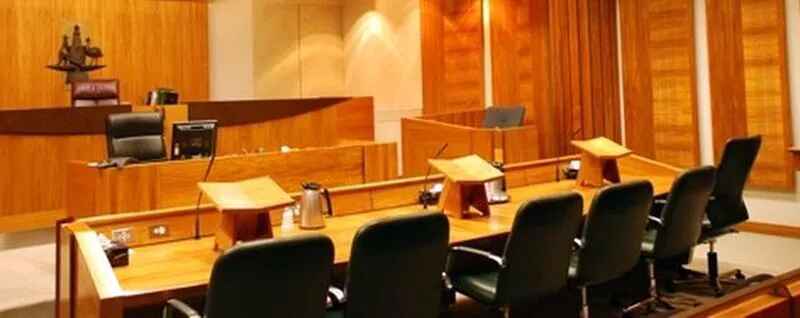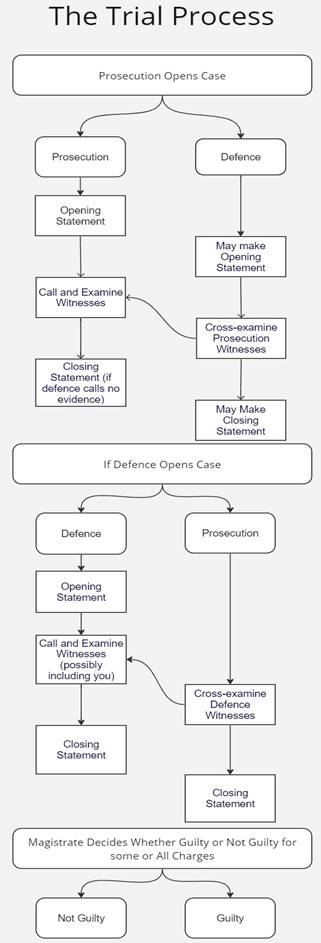
In the Queensland system of criminal justice, once a person is charged with criminal offences there are broadly three ways the charges get resolved: a plea of guilty, the prosecution withdraw the charges, or a trial. This article will be about trials, so strap in, there is a lot to cover.
How do I know when I should go to trial?
Our article titled “Deciding How to Plead to a Criminal Offence” covers this well, but the short version is, if you did not commit the offence, or the prosecution cannot prove you did, you should take it to trial.
Why would my case go to trial in the Magistrates Court instead of another court?
Legally, most charges and cases are decided in the Magistrates Court. The more serious offences, such as drug trafficking, grievous bodily harm, and rape, will be heard in higher courts. Some charges can be heard in either the Magistrates Court or higher courts, but we need not go into that here.
Charges that stay in the Magistrates Court are still considered serious. People are routinely sentenced to jail in the Magistrates Court, and the court can impose a maximum of three years imprisonment.
Where you have the option of having your trial heard in the Magistrates Court or higher courts, there are a number of factors to consider, including cost, delay, whether you want a jury, and the maximum penalty.
How do I get to a trial in the Magistrates Court?
By entering a plea of ‘not guilty’ in court. The magistrate marks this down on the court file, and then a number of things happen.
First, the police must produce a full brief of evidence. This will contain witness statements and exhibits such as video footage, photographs, and forensics.
Second, once your solicitor receives the full brief of evidence, he or she will analyse it to determine whether the prosecution can prove their case, will take your instructions on what happened, and then give advice about likely outcomes.
Third, based on the advice given by your solicitor you will make decision whether you wish to persist with the trial, send a submission or change your plea to guilty. If the plea remains not guilty, then the case will have a date in the Magistrates Court for your trial.
What happens at a trial?
On the day of the trial [most trials in the Magistrates Court take only one day], the magistrate will listen to and view the evidence, and decide whether you are guilty beyond reasonable doubt.
It is the prosecution who must prove your guilt. They must do this beyond reasonable doubt, which means it’s not sufficient for the magistrate think that you are possibly, or even probably guilty, but he or she must have no reasonable doubt about it.
How does the trial proceed? I have created a chart which I hope will assist you to visualise how it happens in court:

Will I need to give evidence or speak in court?
The answer is maybe. You have a legal right to silence, which means you are not obligated to give evidence in support of your defence.
You might have given a recorded interview to police, in which case, your version of events may already be available without the need to speak in court.
There are disadvantages to telling your story in court, including: the prosecutor gets the opportunity to cross-examine you, you might get flustered and accidentally say something which hurts your case, or what you say might be inconsistent with something you've said prior [such as if you had given a police interview].
In general, if it looks like the prosecution are unable to prove their case on the evidence they have presented, then it would usually be the right call not to give evidence. If, however, the prosecution do look like they are able to prove their case, and the credibility and reliability of prosecution witnesses has not been damaged enough by your lawyer’s cross -examination of them, your best option may be to give evidence yourself to have a chance of winning the trial.
But the witnesses have lied! Surely I will be found not guilty?
Although the stated purpose of the trial process is to discover the truth of what happened, the reality is that the magistrate is presented with two different arguments about what happened: one from the prosecution, the other from the defence. It may well be the case that one or more witnesses lie in their testimony. Hopefully, in that situation, a lying witness will have had their credibility forcefully challenged when questioned by defence counsel.
It is important to keep in mind that each case, the prosecution and the defence, is designed to persuade the magistrate to reach a certain conclusion, and this may not necessarily be in perfect alignment with what really happened. As the saying goes, “there are two sides to every story”.
Whay happens at the end of the trial?
The magistrate decides whether you are guilty or not guilty. If you are found guilty, usually the sentence will proceed immediately. The main disadvantage with losing a trial is you should expect a harsher penalty than you would have gotten had you pleaded guilty.
If you win the trial, this is called an acquittal. This means the charge against you is dismissed, and there is no penalty.
Can I get costs?
If you win, you can argue for costs. There is a legal test the magistrate must follow to decide whether costs should be granted in your favour. Bear in mind, there is a limit to the amount of costs the magistrate can order in your favour, and you would not recover the full amount of your legal fees.
Conclusion
As you can see, Magistrates Court trials are complicated, and the decision whether to go to trial is often a difficult one. If you or someone you know is in such a situation, you need expert legal advice. All Clarity Law’s solicitors are fully qualified and experienced. We can help you to make the best choice for your situation.
How do I get more information or engage you to act for me?
If you want to engage us or just need further free information or advice then you can either;
-
Use our contact form and we will contact you by email or phone at a time that suits you
-
Call us on 1300 952 255 seven days a week, 7am to 7pm
-
Click here to select a time for us to have a free 15 minute telephone conference with you
-
Email the firms founder on This email address is being protected from spambots. You need JavaScript enabled to view it.
We are a no pressure law firm, we are happy to provide free initial information to assist you. If you want to engage us then great, we will give you a fixed price for our services so you will know with certainty what we will cost. All the money goes into a trust account monitored by the Queensland Law Society and cannot be taken out without your permission or until we are legally allowed to.






